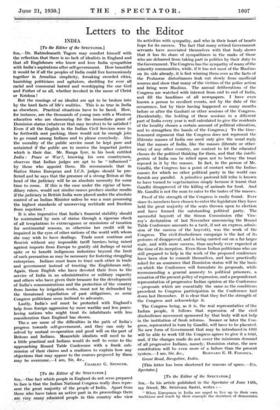Letters to the Editor
INDIA [To the Editor of the SPECTATOR.]
Sur,—Dr. Rabindranath Tagore may comfort himself with the reflection that there is no lack of idealists in England and that all Englishmen who know and love India sympathize with India's aspirations after self-government. How beautiful it would be if all the peoples of India could live harmoniously together in Arcadian simplicity, forsaking crowded cities, banishing politicians and agitators, shedding for ever all racial and communal hatred and worshipping the one God and Father of us all, whether invoked in the name of Christ or Krishna !
But the musings of an idealist are apt to be broken into
by the hard facts of life's realities. This is as true in India as elsewhere. Practical situations have to be faced. How, for instance, are the thousands of young men with a Western education who are clamouring for the immediate grant of Dominion status (whatever that may involve) to be satisfied ? Even if all the English in the Indian Civil Services were to be forthwith sent packing, there would not be enough jobs to go round among Indians and to please everybody. Also the morality of the public service must be kept pure and untainted if the public are to receive the impartial justice which is their due. Mr. Bangs Iyer, in his book entitled India : Peace or War ?, knowing his own countrymen, observes that Indian judges are apt to be " influenced " by those who appoint them. He recommends that in igative States European and I.C.S. judges should be pre- feired and he says that the presence of a strong Briton at the head of the judiciary will be an absolute necessity for some time to come. If this is the case under the regime of here- ditary rulers, would not similar causes produce similar results if the judiciary in British India were placed under the absolute control of an Indian Minister unless he was a man possessing the, highest standards of unswerving rectitude and freedom from nepotism ?
It is also imperative that India's financial, stability should
be maintained by men of status through a rigorous check of all temptations to extravagance or remissions of taxation for sentimental reasons, as otherwise her credit will be impaired in the eyes of other nations of the world with whom she may wish to have dealings. Trade must continue and flourish without any impossible tariff barriers being raised against imports from Europe to gratify old feelings of racial spite or to benefit indigenous industries beyond the limit of such precaution as may be necessary for fostering struggling enterprises. Indians must learn to trust each other in trade and government instead of trusting the Englishman only. Again, those English who have devoted their lives to the service of India in an administrative or military capacity and others who have given their treasure for the development of India's communications and the protection of the country from famine by irrigation works, must not be defrauded by the threatened repudiation of past obligations, as some Congress politicians seem inclined to advocate.
Lastly, India's soil must be protected with England's help from foreign aggression by more warlike and less peace- loving nations who might treat its inhabitants with less consideration than England has shown.
Thee are some of the difficulties in the path of India's progress towards self-government, and they can only be solved by mutual co-operation and good will on the part of Britons and Indians. Meanwhile idealists will need to be a little practical and Indians would do well to come to the approaching Round Table Conference with a frank sub- mission of their claims and a readiness to explain how any objections that may appear to the courses proposed by them may be overcome.—I am, Sir, &c.,
CHARLES G. SPENCER.








































 Previous page
Previous page